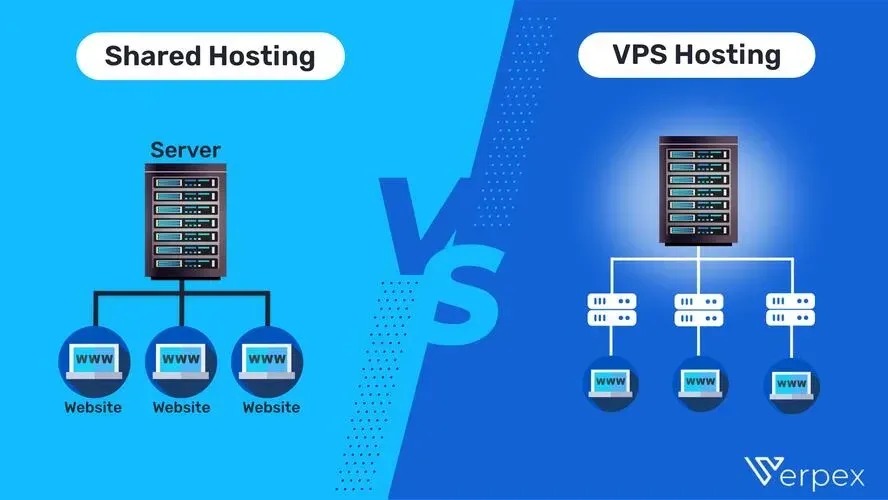Understanding Shared Hosting
Shared hosting is a type of web hosting where multiple websites are hosted on a single server. Each website shares the server’s resources, such as CPU power, RAM, and disk space. This makes it an affordable option for small websites or blogs with low traffic.
One advantage of shared hosting is its ease of use. The hosting provider takes care of server maintenance and updates, allowing website owners to focus on their content.
However, shared hosting has its limitations. As multiple websites share the same resources, there is a risk of slower performance if one website experiences high traffic. Additionally, customization options are limited, as users have to abide by the server’s configurations and restrictions imposed by the hosting provider.
Overall, shared hosting is suitable for beginners or small websites with low to moderate traffic. It offers an affordable and easy-to-use hosting solution.
Exploring VPS Hosting
VPS stands for Virtual Private Server. Unlike shared hosting, VPS hosting provides dedicated resources to each website hosted on the server. It uses virtualization technology to create virtual servers within a physical server, allowing users to have more control and flexibility.
With VPS hosting, users have root access to their virtual server, enabling them to install and configure software as needed. This level of customization is beneficial for websites that require specific software or have high resource demands.
Another advantage of VPS hosting is better performance. Since resources are not shared with other websites, there is less risk of slowdowns due to high traffic on other sites. This makes VPS hosting suitable for websites with medium to high traffic or resource-intensive applications.
However, VPS hosting is more expensive than shared hosting and requires some technical knowledge to manage the server effectively. It is recommended for website owners who require more control, customization, and performance.
Comparing Performance and Resources
When it comes to performance and resources, shared hosting and VPS hosting differ significantly.
In shared hosting, the resources are shared among multiple websites. This means that if one website experiences a sudden surge in traffic or resource usage, it can affect the performance of other websites on the same server. Shared hosting is suitable for websites with low to moderate traffic and resource requirements.
On the other hand, VPS hosting provides dedicated resources to each website. This ensures better performance and prevents other websites from impacting the performance of your site. VPS hosting is ideal for websites with medium to high traffic or resource-intensive applications.
In terms of scalability, shared hosting has limitations as the resources are shared among multiple websites. If your website experiences significant growth in traffic or resource requirements, it may outgrow the limitations of shared hosting. VPS hosting, on the other hand, allows for scalability as resources can be easily allocated or upgraded to meet the growing demands of your website.
In summary, shared hosting is suitable for small websites with low traffic, while VPS hosting is recommended for websites with medium to high traffic or resource-intensive applications that require better performance and scalability.
Analyzing Scalability and Customization
Scalability and customization are important factors to consider when choosing between shared hosting and VPS hosting.
Shared hosting has limitations when it comes to scalability. As the resources are shared among multiple websites, there is a limit to how much your website can grow in terms of traffic and resource requirements. If your website experiences significant growth, you may need to upgrade to a VPS hosting plan or switch to a dedicated server.
On the other hand, VPS hosting offers more scalability. You have dedicated resources that can be easily upgraded or allocated to meet the growing demands of your website. This allows for better performance and ensures that your website can handle increased traffic or resource requirements.
In terms of customization, shared hosting has limitations as users have to abide by the server’s configurations and restrictions imposed by the hosting provider. You have limited control over the server environment and software installations.
With VPS hosting, you have root access to your virtual server, giving you full control and flexibility. You can install and configure software as needed, customize server settings, and optimize the server for your website’s specific requirements.
In conclusion, if scalability and customization are important to you, VPS hosting is the better option as it offers more flexibility and control over your website’s growth and customization.
Considering Cost and Budget
Cost is an important factor to consider when choosing between shared hosting and VPS hosting.
Shared hosting is the more affordable option as the cost is shared among multiple websites. It is suitable for small websites or blogs with low traffic that have a limited budget.
VPS hosting, on the other hand, is more expensive as you have dedicated resources and more control over the server. The cost increases with the level of resources and customization required. It is suitable for websites with medium to high traffic or resource-intensive applications that require better performance and scalability.
When considering cost, it is important to assess your website’s needs and budget. If you are just starting and have a limited budget, shared hosting may be the better option. However, if you require more control, customization, and performance, and have the budget to support it, VPS hosting is worth considering.
In summary, shared hosting is the more cost-effective option for small websites with low traffic, while VPS hosting is a higher-priced option for websites that require better performance and scalability.


Leave A Comment